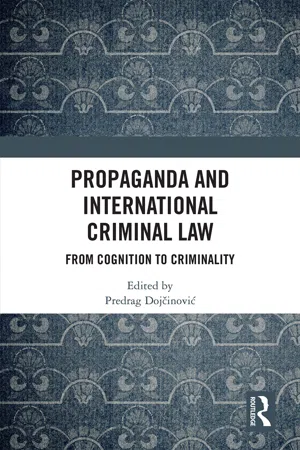The self-declared Islamic State (ISIS/ISIL/IS/Da’esh) spread their propaganda far and wide through radio stations, television, social media, online forums, physical distribution of writings, and so on.1 When assessing whether this propaganda constitutes the international crime of direct and public incitement to commit genocide, one must consider utterances which directly fulfil the necessary actus reus and mens rea of said crime as well as the propaganda techniques used in the surrounding narrative which prepares the audience to become susceptible to carrying out such calls.
Dealing with the crime of incitement to genocide itself is unique in the sense that it requires the expertise of linguistics in order to determine the meaning of the words uttered in their geographical, cultural or religious contexts. For example, in determining whether incitement to genocide took place, the International Criminal Tribunal for Rwanda (ICTR) was faced with the challenging task of understanding the Kinyarwanda language.2 None of the judges and very few lawyers in the prosecution and defense teams spoke the language.3 Alexander Zahar argues that the tribunal was thinking in English semantics rather than Kinyarwanda semantics.4 Essentially, thinking in different semantics and through the prism of a different culture or tradition can result in a failure to accurately determine the intent of the speaker as well as how the targeted audience perceived a certain discourse, both essential elements of establishing the crime of incitement to genocide.5
ISIS ideology and its embeddedness in Jihādi-Salafı̄sm
The ISIS jihādi campaign is a mixture of Salafīsm and Qutbism.11 The term Salafı̄sm is a form of Islamic revivalism which seeks to bring society back to the practices of the first three generations of Muslims, the salaf.12 This idea as well as the rest of the core Salafı̄ theological corpus was adopted from the medieval scholar Ibn Taymiyyah (d. 1328), a controversial figure of his time, who has become one of the most influential medieval writers in contemporary Islam.13 According to Taymiyyah, the correct method of interpreting the Qur’ān was crucial. He attacked what was known as ‘tafsı̄r al-Qur’ān bi-al-ra’y (interpretation based on personal opinion) and contended that even if one arrived thus at the true divine meaning of the Qur’ān, such an interpretation would have to be rejected since it was done through the wrong method.14 According to him, one is strictly bound in their interpretation of the Qur’ān to the Qur’ān itself, the Sunnah (the Prophet’s acts and words) and the interpretations of the salaf, considering them more knowledgeable due to their proximity to the revelation.15 While the medieval exegetical tradition refused to succumb to such a radical restriction on the authority of the exegete,16 Taymiyyah’s radical hermeneutics, nevertheless, resonates with a segment of the Muslim population. As is the case for all Muslims, the fundamental component running through the belief of Salafı̄sm is the doctrine of God’s oneness (tawhı̄d).17 However, Salafı̄s principally criticize other Muslims for what they see as denying tawhı̄d by corrupting the faith with beliefs and practices that are not Islamic. The idea that most Muslims despite professing tawhı̄d do not follow or even understand it was also espoused by Mohamad bin Abdel Wahhab, the founder of the Saudi, and arguably more radical, version of Salafı̄sm pejoratively called Wahhabism.18 In this sense, Saudi Salafı̄sm presented itself as a correction to widespread jahiliyyah (ignorance) declaring anyone else an infidel.19
Salafı̄sm evolved in the twentieth century, with the emergence of Hassan al-Banna’s Society of the Muslim Brotherhood (al-Ikhwān al-Muslimı̄n). A legendary speaker himself, Banna carefully chose other individuals with oratorical capabilities for high positions within the society, created his own press and played heavily on the emotions of people to win support.20 Most importantly, he organized mass meetings for strengthening loyalties, proclaiming aloud the facts of unity, universality and power, and creating an atmosphere of internal strength and hostility to the outside world.21 These propaganda techniques were highly effective, and the Brotherhood became the ideological and institutional epicenter of fundamentalism in the Arab sphere and the Islamic world.22
ISIS echo these divisive propaganda techniques and the Salafı̄st ideology in the aggressive assertion that their view is the only pure and authentic interpretation of the worship of God. To give legitimacy to this claim, they purport to follow the so-called prophetic methodology (‘ala minhaj al-nubuwwa). They have produced a video on the topic,23 and all major decisions and laws promulgated are claimed in their press pronouncements and on billboards, license plates, stationery and coins to adhere to said methodology.24 Unsurprisingly, they also call their political creation the ‘Caliphate on the prophetic methodology’ and claim that all the Shari‘āh institutions therein, training camps and even the kindergartens, are on the methodology of prophethood.25 This propaganda...
